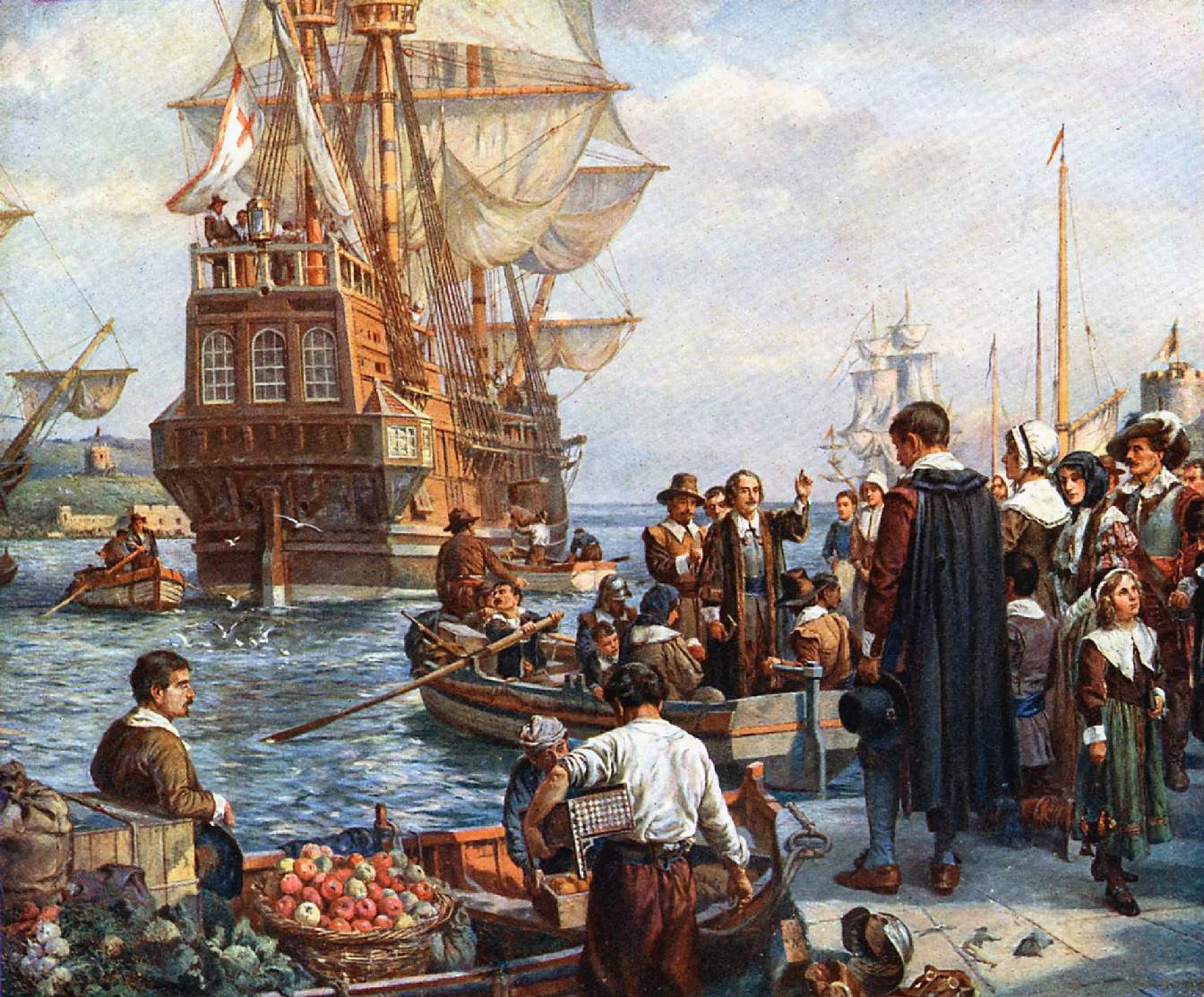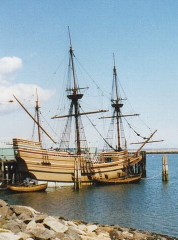|

Mayflower
painting under sail from Devon, Plymouth - heading for Massachusetts,
USA
THE
PILGRIM FATHERS
The
Separatists were
less numerous by far than other classes of
Nonconformists, yet they formed the advance guard of the
great Puritan exodus from the mother country to the
shores of New England. The town of Scrooby in
Nottinghamshire was the center of a scattered
congregation of Separatists whose minister was John
Robinson and whose ruling elder was William Brewster,
the village postmaster. After enduring many persecutions
this little band of Christians, who now became
"Pilgrims," escaped with difficulty from their
native land to Amsterdam, Holland, whence a year later
they removed to Leyden. Here they dwelt for eleven
years, exiles for conscience' sake, earning their bread
by the labor of their hands.
But the
Pilgrims felt that Holland was not their home; they
could not endure the thought of giving up their language
and customs for those of the Dutch, nor were they
willing to return to their native England, where
religious persecution had not abated. They had heard of
the colony of Virginia,
and their thoughts were directed to the wilderness of
the New World.
THE
'SPEEDWELL' AND 'MAYFLOWER' SHIPS
Through
the friendship and aid of Sir Edwin Sandys, and others,
they secured a little money and purchased a little
vessel, the Speedwell, hired another, the Mayflower,
and determined to cross the wide waters to America,
where they might worship God in their own way and still
be Englishmen. Having secured a grant from the Virginia
Company to settle in the Hudson Valley, and a promise
from the king that he would not interfere with them, and
having mortgaged themselves to a company of London
merchants, they set forth with brave hearts to encounter
the unknown perils of the sea and of the wilderness.
The Speedwell
proved unfit for the sea, and the little band reŽmbarked
from Plymouth, England, in the Mayflower alone.
Their minister Robinson had remained in Leyden, and
Brewster was the leader. He and John Carver were well
advanced in years, but most of the company were in the
prime of life. William Bradford was thirty and Edward
Winslow was twenty-five. Before leaving Plymouth they
were joined by Miles Standish, a sturdy soldier of
thirty-six, who was in sympathy with the movement though
not a member of the congregation.
The
"Pilgrim Fathers" with their wives and
children, as borne by the Mayflower, numbered one
hundred and two; one died on the voyage and one was
born. After a perilous voyage of many weeks they
anchored off the coast of New
England, far from the point at which they had aimed,
and here they were obliged to remain.
THE
COMPACT - THE FIRST WRITTEN CONSTITUTION
Being
north of the bounds of the company that had granted them
a patent, they occupied a country to which they had no
legal right. Before landing they drew up a compact for
the government of the colony and chose John Carver
governor for the first year. This compact, the
"first written constitution in the world," was
an agreement by which they pledged themselves
"solemnly and mutually, in the presence of God and
of one another," to form a body politic, to frame
such laws as they might need, to which they promised
"all due submission and obedience."
The
compact was signed by all the adult males, forty-one in
number, on the 11th of November, the day on
which the Mayflower
entered Cape Cod harbor.
An
exploring party went ashore, and they found the country
bleak and uninviting in the extreme. The snow was half a
foot deep, and the fierce wind blew the spray of the sea
upon them where it froze until their "clothes
looked like coats of iron."
But the
Pilgrims had not sought ease and comfort; they expected
hardships and discouragements. They chose Plymouth
harbor as a landing place, and on December 16, one
hundred and two days after leaving Plymouth, England,
they made a landing in the face of a wintry storm, on a
barren rock since known as Plymouth Rock. Next they
"fell vpon their knees and blessed ye
God of heaven, who had brought them ouer ye
vast and furious ocean."
In
a few days the men were busily engaged in building
cabins, returning each night to the ship; but ere they
were finished the wintry blasts had planted the seeds of
consumption in many of the little band, and before the
coming of spring more than forty of them, including the
wives of Bradford, Winslow, and Standish, had been laid
in the grave. And yet when the
Mayflower
sailed
for England in the early spring, not one of the
survivors returned with her, and it is a singular face
that nearly all who survived that dreadful winter at
Plymouth lived to a good old age. Among those who died
the first year was Governor Carver, and William
Bradford, the historian of the colony, was chosen to
fill the office, and he held the position for thirty-one
years.

ACIDIFICATION
- ADRIATIC
- ARCTIC
- ATLANTIC
- BALTIC
- BERING
- CARIBBEAN
- CORAL
- EAST
CHINA
ENGLISH
CH - GOC
- GULF
MEXICO - INDIAN
- MEDITERRANEAN
- NORTH
SEA - PACIFIC
- PERSIAN
GULF - SEA
JAPAN
STH
CHINA - PLASTIC
- PLANKTON
- PLASTIC
OCEANS - SEA
LEVEL RISE - UNEP
MARITIME HISTORY
GENERAL HISTORY
|